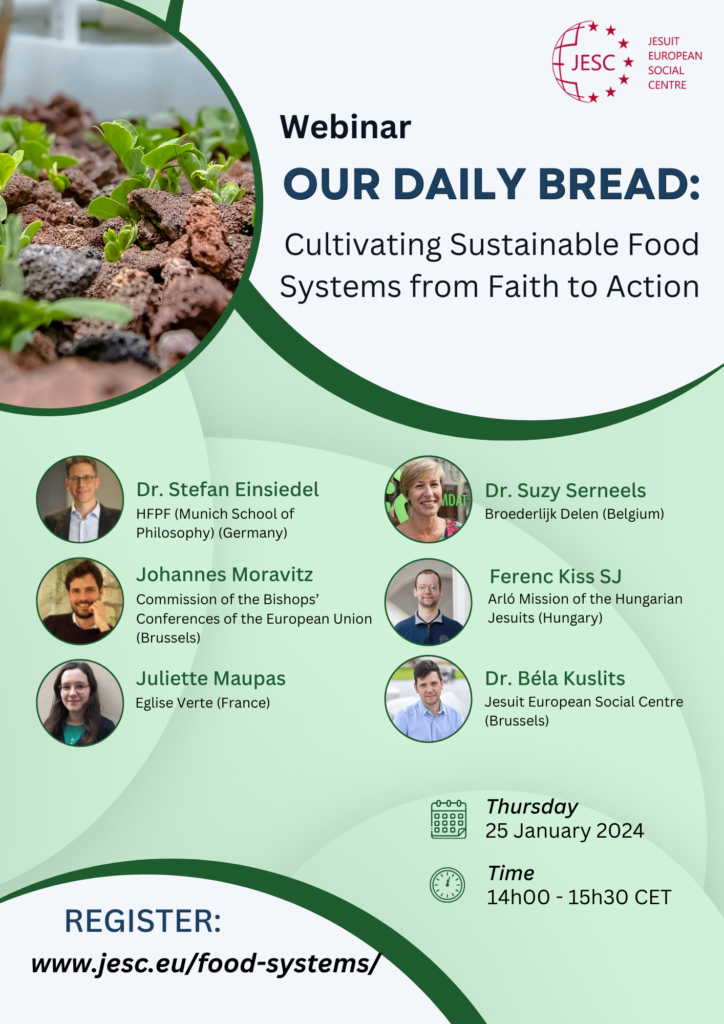
The Our Daily Bread webinar, on January 25th 2024, provided a deep dive into the crucial role played by Faith Based Organisations (FBOs) in shaping sustainable agriculture across Europe.
 The starting point for the conversation was the conclusion of the research project that was carried out in the second half of 2023 by JESC. Béla Kuslits, JESC Senior Eecology Officer introduced the context, the results and the way forward as we envision the next steps of this work.
The starting point for the conversation was the conclusion of the research project that was carried out in the second half of 2023 by JESC. Béla Kuslits, JESC Senior Eecology Officer introduced the context, the results and the way forward as we envision the next steps of this work.
With about one-third of the EU’s budget allocated to the Common Agricultural Policy, coupled with other impactful policies such as the Nature Restoration Law and Soil Monitoring and Resilience Directive, the ecological and social implications of Food Policy are profound. Food is not only integral to our cultures, but its prices are among the most important economic and social indicators. What we eat, how we eat, and what is our relationship to the people who grow the food are all fundamental aspects of our societies.
Despite the clear message in Pope Francis’s Laudato Si, the need for more proactive measures remains evident. Indeed, FBOs could play a significant role in this space, thereby prompting the coalition-building initiative by JESC. We started with mapping FBOs who work in the field of food across the 27 EU countries. Our study revealed 150 organisations engaged in community works, advocacy, rural development, international development, direct land use, and research. Through their social media presence, they are reaching at least 1.6 million people, but the potential impact could be amplified even more, considering that 20% of the population in Western countries regularly attends church — a powerful demographic having the power to vote and influence.
The subsequent feasibility study among 30 organisations out of the 150 identified three primary areas of focus for sustainable agriculture within these groups: a vision of agroecology, lifestyle changes including dietary shifts and supply chain transformations, and solidarity with the Global South and rural Europe.
Kuslits presentation: Faith-based Organisations in European Food Policy
The second part of the webinar featured five distinguished speakers, each contributing a unique perspective:
Dr. Stefan Einsiedel, from the Munich School of Philosophy, provided insight into the alarming escalation of pressure on our precious and limited resource – our land. He disclosed that a mere 29% of Earth’s surface constitutes land, with only 71% of it being habitable. Shockingly, almost half of this habitable land is already utilised for agricultural purposes, leaving only a small fraction untouched. The soil faces ongoing challenges, including shrinkage caused by new infrastructure, degradation, and desertification, among others. Safeguarding biodiversity necessitates the preservation of untouched ecosystems.
Einsiedel presentation: How Socio-ecological Transformation can Succeed
Dr. Suzy Serneels, the representative from Broederlijk Delen, brought attention to the unsustainable exploitation of natural and human resources within our global economy. She advocated for adopting a model, such as the doughnut economy, which considers the ecological ceiling whilst ensuring the preservation of social foundations. Stressing the significant role of food systems in crossing these boundaries, Dr Serneels emphasised the urgent need to address not only food production but also the power dynamics inherent within the food systems.
Serneels presentation: Sustainable Food Systems Need System Change
- Johannes Moravitz, from COMECE, emphasised an integral understanding of ecology based on the Laudato Si’ encyclical, stressing the interconnectedness of economic, cultural, and social structures, as well as citing that humans should remain at the centre of solutions.
- Juliette Maupas, from Église Verte, presented a practical eco-conversion tool for Christian communities, illustrating it with a long list of sustainable practices across 850 networks.
Maupas presentation: Eglise Verte Communities & Sustainable Food Systems
- Finally, Ferenc Kiss SJ discussed the example of Hungarian rural gipsy communities and highlighted the need to revitalise agriculture to foster community bonds against poverty and the throwaway culture.
The overarching theme emphasised the urgency for FBOs to unite and collaborate in advocating for sustainable agriculture, and actively contribute to shaping policies for a more resilient and equitable food system. The webinar served as a call to action for those vested in the intersection of faith and sustainable food systems, urging a united front in the pursuit of positive change. With this in mind, JESC envisions the possibility of creating a faith-based advocacy network on Food Policy, and will soon invite other partners interested in the cause, to discern together what the next steps might be.

